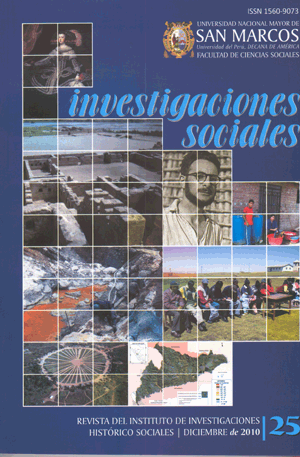Julio C. Tello and Archeology of Peru at the Universidad Nacional Mayor de San Marcos
DOI:
https://doi.org/10.15381/is.v14i25.7281Keywords:
Archeology, anthropology, education, students of archeology, archeological research, relative chronology.Abstract
Archaeology is the science of context and contextualized associations, therefore, is knowledge derived from empirical indicators whose studies to acquire more of a knowledge of inferential relations. Archaeologists studying the archaeological sites are actually discovering social formations, digging up people who had lives, their pasts territorial settlement patterns, the techniques invented, various practical applications, self-managed forms of social organization, architecture, urbanism, processing and domestication of natural resources through social work and social organization and ways of thinking, self-generated impulse of human processes in place.Downloads
Published
Issue
Section
License
Copyright (c) 2010 Alberto Bueno Mendoza

This work is licensed under a Creative Commons Attribution-NonCommercial-ShareAlike 4.0 International License.
AUTHORS RETAIN THEIR RIGHTS:
a. Authors retain their trade mark rights and patent, and also on any process or procedure described in the article.
b. Authors retain their right to share, copy, distribute, perform and publicly communicate their article (eg, to place their article in an institutional repository or publish it in a book), with an acknowledgment of its initial publication in Investigaciones Sociales.
c. Authors retain theirs right to make a subsequent publication of their work, to use the article or any part thereof (eg a compilation of his papers, lecture notes, thesis, or a book), always indicating the source of publication (the originator of the work, journal, volume, number and date).






